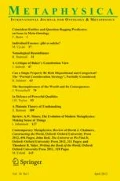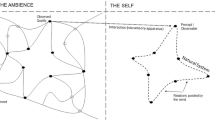Abstract
This article attacks ‘open systems’ arguments that because constant conjunctions are not generally observed in the real world of open systems we should be highly skeptical that universal laws exist. This work differs from other critiques of open system arguments against laws of nature by not focusing on laws themselves, but rather on the inference from open systems. We argue that open system arguments fail for two related reasons: 1) because they cannot account for the ‘systems’ central to their argument (nor the implied systems labeled ‘exogenous factors’ in relation to the system of interest) and 2) they are nomocentric, fixated on laws while ignoring initial and antecedent conditions that are able to account for systems and exogenous factors within a fundamentalist framework.
Similar content being viewed by others
Notes
Other critiques also focus on the inference by many open-systemists from anti-fundamentalism to ‘natures,’ ‘tendencies,’ or ‘capacities,’ which we do not discuss here. If correct, our argument preempts this inference.
Some of the points briefly raised in Earman et al. 2002 come closest to our argument. They criticize Lange 1993, who presents an argument on ‘provisos’ similar to the position of Cartwright, for inattention to boundary conditions (Earman et al. 2002, p. 284) and argue that Cartwright confuses laws and differential equations of motion while neglecting initial conditions (286 and endnote 5). Otherwise, to our knowledge there has been little sustained attention to the importance of initial conditions to the open system argument. Bhaskar 1975 does discuss initial conditions towards its conclusion (1975, pp. 236–237); however, by that point the discussion is entirely within terms of his ‘transcendental realist’ argument. Cartwright mentions initial conditions in scattered remarks; again we find no passage that clearly addresses our concerns. A point similar to part of our argument on systems is made by Ruphy (2003), particularly when she asks Cartwright how theoretical domains are to be divided into “bits and pieces” (2003, p. 61).
Other examples include the unification of Charles’ law and Boyle’s law under the Ideal Gas law and Maxwell’s unification of theories of electro-magnetism and optics.
Many philosophy articles that do mention initial conditions do so within a modal or “possible worlds” context, discussing the necessity/contingency of laws (e.g., Schlesinger 1987; Sklar 1991; Beebee 2002; Bird 2002); the direct relevance of these to our discussion of explanation in the actual universe is not clear (however, see Frisch 2004 for a possible exception).
Even when initial conditions are recognized as important, precisely how and why seldom seems to be pursued by philosophers. For example, in their discussion of inflationary cosmology, Earman and Mosterin state that “[t]hese issues about the nature of scientific explanation and the role of initial/boundary conditions are well worth pursuing, but we will not do so here” (1999, p. 20).
The study of quantum-to-classical transitions with an emphasis on their ubiquity in our universe of open systems. Systems can be caused to decohere by outside interference as faint as radiation from the Cosmic Microwave Background (Zurek 1991).
Open-systemists also use the terms interchangeably, e.g., in reference to economics and its “concepts” (law-like regularities) Cartwright states that: “nothing follows from the concepts themselves without embedding them in a structure, and only special structures (i.e. “nomological machines”) will yield any deductive consequences at all” (2002b, p. 147).
This of course begs the question of whether we can explain the beginning of the universe, as in chaotic inflation, multiverse and anthropic principle scenarios (Tegmark 2004 provide a useful classification of the possibilities). This is beyond the scope of our discussion. However, it is possible that laws, constants, and initial conditions of the universe may simply have to be accepted as “brute facts” (see Callender 2004).
References
Albrecht, Andreas (1996), “How to Falsify Scenarios with Primordial Fluctuations from Inflation”, astro-ph/9612017.
Anderson, Philip (2001), “Science: A ‘Dappled World’ or a ‘Seamless Web’?” Studies in History and Philosophy of Science Part B: Studies in History and Philosophy of Modern Physics 32 (3): 487–494.
Auletta, Gennaro (2000), Foundations and Interpretation of Quantum Mechanics in the Light of a Critical-Historical Analysis of the Problems and of a Synthesis of the Results. Singapore: World Scientific.
Barvinsky, A O, A Yu Kamenshchik, Kiefer, IV Mishakov (1999), “Decoherence in Quantum Cosmology at the Onset of Inflation”, Nuclear Physics B 551: 374–396.
Beebee, Helen (2002), “Contingent Laws Rule”, Analysis 62: 252–255.
Bhaskar, Roy (1975), A Realist Theory of Science. Leeds: Leeds Books.
Bird, Alexander (2002), “On Whether Some Laws are Necessary”, Analysis 62: 257–270.
Burock, Marc (2004), “Determinism and Causation Examples”, Philosophy of Science Archive, University of Pittsburgh.
Callender, Craig (2004), “Measures, Explanations and the Past: Should ‘Special’ Initial Conditions Be Explained?”, British Journal for the Philosophy of Science 55(2): 195–217.
Carter, Jessica (2005), “Individuation of Objects – A Problem for Structuralism?”, Synthese 143: 291–307.
Causey, Robert L. (1969), “Polanyi on Structure and Reduction”, Synthese 20: 230–237.
Cartwright, Nancy (1999), The Dappled World: A Study of the Boundaries of Science. Cambridge: Cambridge University Press.
Cartwright, Nancy (2002a), “In Favor of Laws that are not Ceteris Paribus After All”, Erkenntnis 57: 425–439.
Cartwright, Nancy, (2002b), “The Limits of Causal Order, from Economics to Physics,” in Mäki, Uskali (ed.), Fact and Fiction in Economics, Cambridge: Cambridge University Press.
Churchman, CW, Ackoff, RL, and Arnoff, LE (1957). Introduction to Operations Research. Wiley, New York.
Clarke, Kevin A. (1999), “Probabilistic Causality and Explanation in Political Science”, Annual Meeting of the American Political Science Association September 2–5, 1999 Atlanta, GA.
Drake, M.J., and K. Righter. (2002), “Determining the Composition of the Earth”, Nature 416: 39–44.
Earman, John (2004), “Determinism: What We Have Learned and What We Still Don’t Know”, in Joseph Keim Campbell, Michael O’Rourke, and David Shier (eds.), Freedom and Determinism. Cambridge, Mass: MIT Press.
Earman, John, and Jesus Mosterin (1999), “A Critical Look at Inflationary Cosmology”, Philosophy of Science 66: 1–49.
Earman, John, and John Roberts (1999), “Ceteris Paribus, There is no Problem of Provisos”, Synthese 118: 439–478.
Earman, John, John Roberts, and Sheldon Smith (2002), “Ceteris Paribus Lost”, Erkenntnis 57: 281–301.
Frisch, Mathias (2004), “Laws and Initial Conditions”, Philosophy of Science, 71: 696–706.
Gies, Douglas, and John Helsel (2005), “Ice Age Epochs and the Sun’s Path Through the Galaxy”, Astrophysical Journal 626: 844–848.
Hall, A.D., and R.E. Fagen (1956), “Definitions of a System”, in L. von Bertalanffy and A. Rapoport (eds.), General Systems: Volume I. Ann Arbor: University of Michigan Press.
Halonen, Ilpo, and Jaakko Hintikka (2005), “Toward a Theory of the Process of Explanation”, Synthese 143: 5–61.
Hoefer, Carl (2003), “For Fundamentalism”, Philosophy of Science 70: 1401–1412.
Hoffman (2001a), “The Moon and Plate Tectonics: Why We are Alone”, Space Daily (website) July 11, http://www.spacedaily.com/news/life-01x1.html.
Hoffman (2001b), “Venus – What the Earth Would Have Been Like”, Space Daily (website) July 11, http://www.spacedaily.com/news/life-01x2.html.
Humphreys, Paul (1989), The Chances of Explanation: Causal Explanation in the Social, Medical, and Physical Sciences. Princeton: Princeton University Press.
Kiefer, Claus, and David Polarski (1998), “Emergence of Classicality for Primordial Fluctuations: Concepts and Analogies”, Annalen der Physik 7: 137–158.
Kiefer, Claus, David Polarski, and Alexei Starobinsky (1998a), “Quantum-to-Classical Transition for Fluctuations in the Early Universe”, International Journal of Modern Physics D 7: 455–462.
Kiefer, Claus, Julien Lesgourgues, David Polarski, and Alexei Starobinsky (1998b), “The Coherence of Primordial Fluctuations Produced During Inflation”, Classical and Quantum Gravity 15: L67–L72.
Kline David A. and Carl A. Matheson (1986), “How the Laws of Physics Don’t Even Fib”, in Arthur Fine and Peter Machamer (eds.), PSA 1986: vol. 1. East Lansing, MI: Philosophy of Science Association, 33–41.
Lange, M (1993), “Natural Laws and the Problem of Provisos”, Erkenntnis 38: 233–248.
Lombardo, Fernando C (2005), “Influence Functional Approach to Decoherence During Inflation”, Brazilian Journal of Physics 35 (2B): 391–396.
Marchal J. H. (1975), “On the Concept of a System”, Philosophy of Science, 42: 448–468.
McAllister, James (1999), “Universal Regularities and Initial Conditions in Newtonian Physics”, Synthese 120: 323–325.
McAllister, James (2004), “Absence of Contingency in the Newtonian Universe”, Foundations of Science 9: 191–210.
Morbidelli, A, J. Chambers, JI Lunine, JM Petit, F. Robert, GB Valsecchi, and K. Cyr, (2000), “Source Regions and Timescales for the Delivery of Water to the Earth”, Meteoritics and Planetary Science 35:1309–1320.
Morowitz, Harold (2002), The Emergence of Everything: How the World Became Complex. Oxford: Oxford University Press.
Norton, John (2003), “Causation as Folk Science”, Philosophy of Science Archive, University of Pittsburgh.
Poland, Jeffrey (1994), Physicalism: The Philosophical Foundations. Oxford: Clarendon.
Price, Huw (2002), “Boltzmann’s Time Bomb”, British Journal for the Philosophy Science 53, 1, 83–119.
Psillos, Stathis (2006), “Cartwright’s Realist Toil: From Entities to Capacities” in Luc Bovens and Stephan Hartmann (eds.), Nancy Cartwright’s Philosophy of Science. London: Routledge.
Resnik, Michael (1997), Mathematics as a Science of Patterns. Oxford: Oxford University Press.
Ruphy, Stéphanie (2003), “Is the World Really ‘Dappled’? A Response to Cartwright’s Charge against ‘Cross-Wise Reduction’”, Philosophy of Science, 70: 57–67.
Shapiro, Stewart (1997), Philosophy of Mathematics: Structure and Ontology. Oxford: Oxford University Press.
Schlesinger, George N (1987), “Nomic Necessity and Contingency”, The Philosophical Quarterly 37: 379–391.
Schlosshauer, Maximilian (2004), “Decoherence, the Measurement Problem, and Interpretations of Quantum Mechanics”, Review of Modern Physics 76(4): 1267–1305.
Sklar, Lawrence (1991), “How Free Are Initial Conditions?” in Arthur Fine, Micky Forbes, and Linda Wessels (eds.), PSA 1990, vol. 2. East Lansing, MI: Philosophy of Science Association, 551564.
Sklar, Lawrence (2003), “Dappled Theories in a Uniform World”, Philosophy of Science, 70: 424–441.
Smith, Sheldon R. (2001), “Models and the Unity of Classical Physics: Nancy Cartwright’s Dappled World”, Philosophy of Science, 68 (4): 456–475.
Spurrett, David (1999), The Completeness of Physics. Ph.D. Dissertation, Durban, South Africa: University of Natal.
Spurrett, David (2001) “Cartwright on Laws of Composition”, International Studies in the Philosophy of Science 15: 253–68.
Tegmark, Max (2004), “Parallel Universes”, in John D. Barrow, Paul C.W. Davies, and Charles L. Harper (eds.), Science and Ultimate Reality: Quantum Theory, Cosmology, and Complexity. Cambridge: Cambridge University Press.
Waldner, David (2002), “Anti Anti-Determinism: Or What Happens When Schrödinger’s Cat and Lorenz’s Butterfly Meet Laplace’s Demon in the Study of Political and Economic Development?”, Annual Meeting of the American Political Science Association, August 29–September 1. Boston MA.
Whittle, Mark (2004), “The Sound of the Microwave Background”, American Astronomical Society Meeting 204.84.06.
Wilson, Mark (1991), “Law along the Frontier: Differential Equations and Their Boundary Conditions” in Arthur Fine, Micky Forbes, and Linda Wessels (eds.), PSA 1990, vol. 2. East Lansing, MI: Philosophy of Science Association, 565–575.
The Wright Center at Tufts University, “Cosmic Evolution”, Website. http://www.tufts.edu/as/wright_center/cosmic_evolution/index.html
Yeghikyan, Ararat, and Hans Fahr (2003), “Consequences of the Solar System Passage Through Dense Interstellar Clouds”, Annales Geophysicae 21: 1263–1273.
Yeghikyan, Ararat, and Hans Fahr (2004), “Terrestrial Atmospheric Effects Induced by Counterstreaming Dense Interstellar Cloud Material”, Astronomy and Astrophysics 425, 1113–1118.
Zeh, Heinz-Dieter (2005), “How Decoherence May Solve the Measurement Problem”, unpublished manuscript.
Zurek, Wojciech (1991), “Decoherence and the Transition from Quantum to Classical”, Physics Today. 44 (10): 36–44.
Zurek, Wojciech (1998), “Decoherence, Einselection and the Existential Interpretation (the Rough Guide)”, Philosophical Transactions of the Royal Society of London, A. 356: 1793–1821.
Zurek, Wojciech (2003), “Decoherence, Einselection and the Quantum Origins of the Classical”, Reviews of Modern Physics 75: 715–775.
Author information
Authors and Affiliations
Corresponding author
About this article
Cite this article
Ballinger, C. Initial Conditions and the ‘Open Systems’ Argument against Laws of Nature. Int Ontology Metaphysics 9, 17–31 (2008). https://doi.org/10.1007/s12133-007-0019-2
Received:
Accepted:
Published:
Issue Date:
DOI: https://doi.org/10.1007/s12133-007-0019-2




